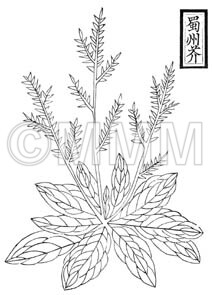Crude drug sample data base
※Click on the image to enlarge it.
The capital city, provincial capital city or the representative
location of its administrative area is indicated.
location of its administrative area is indicated.
Production area information
https://ethmed.toyama-wakan.net/img/pin_san.png
25.234479
110.17995300000007
Collection information
People's Republic of China,Guilin
https://ethmed.toyama-wakan.net/img/pin_nyu.png
Scientific information data base
| Common name | 芥子, Jiezi, Sinapis Semen (CP2020), Mustard Seed (CP2020) | |||||
|---|---|---|---|---|---|---|
| Synonyms | 白芥子, 黄芥子 | |||||
| crude drug image |
| |||||
| Original plant name | 白芥子<White Mustard Seed>: Brassica alba (L.) Boiss. (= Brassica hirta Moench)1;黄芥子<Yellow Mustard Seed>: Brassica juncea Coss. (= B. juncea Czern.)2, (Shirogarashi1, Karashi2) | |||||
| original plant image |
| |||||
| Family name | Brassicaceae | |||||
| Used part | seed | |||||
| Quality for selection | Good Jiezi is as pungent as possible when chewed. (TN) Baijiezi (Jap. name: Byakugaishi) is said to be of higher quality. | |||||
| Official compendium | CP (2020 ed.) | |||||
| Clinical application | As a stimulant, rubefacient and expectorant, jiezi, defatted and pasted with water, is applied for neuritis and pneumonia transdermally. It is widely used as a raw material for spice and volatile mustard oil. | |||||
| Medical system | Traditional Chinese medicine | |||||
| Drug effect in traditional medicine | Traditional classification | Expectorants | ||||
| Beneficial effect | [Property and Flavor] Warm; pungent. [Meridian Tropism] Lung meridian. [Actions] To warm the lung and sweep phlegm, disinhibit qi, dissipate binds and unblock the collaterals to relieve pain. [Indications] Cough with cold-phlegm, distending pain in the chest and the hypochondrium, phlegm stagnation in meridians, joint numbness and pain, phlegm-dampness deep multiple abscess,yin flat-abscesses with swelling and toxin. | |||||
| Chemical constituent | Fatty acids (*C2): 脂肪油/fatty oil 30~35%: Erucic acid, Arachidic acid, Linolenic acid Phenylpropanoids B. juncea (*C1,C2): Sinapic acid, Sinapine, Glucosinolate B. hirta (*C1): Sinalbin 2.5~5%.(酵素 myrosinase により p-Hydroxybenzoyl isothiocyanateを生成) B. juncea (*C1): Sinigrin(酵素 myrosinase により Allyl isothiocyanate を生成) B. nigra (*C1): Sinigrin 1~2.5% (同上) Others B. juncea (*C1,C2): Myrosinase | |||||
| Chemical structure |
※画像をクリックすると、拡大して表示されます。 | |||||
| Pharmacological effect | Skin and mucosal stimulation (mustard seed oil). | |||||
| DNA sequence | AF264734, AF267640, M88342, AF128093, AF128094, D10840, X05060 | |||||
| Classical reference (Chinese Herbal Classic "Zhenglei bencao") |  ※Click this image to see the actual image ※Click this image to see the actual image | |||||
| Disease | Neuralgia, Pneumonia, Sputum, Cough, Swelling and pain of joint | |||||
| Formulation | Seishitsuketanto, Haiyoto | |||||
| Related drugs | Black Mustard Seed | |||||
| References | CP2020: Pharmacopoeia of the People's Republic of China 2020 edi. C1) The Encyclopedia of Wakan-Yaku with Color Pictures Vol. I, pp 232-233. C2) Outline of Pharmacognosy, a Textbook, p 293. | |||||
| Remarks | Jiezi (Jap. name: Gaishi) had been listed in the Japanese Pharmacopoeia until 1971(8th revised edition). It defines the seed of B. juncea and congeners. As a comprehensive term, Karashi, B. juncea (n=18), is amphidiploid, a natural cross between Aburana, B. rapa L (n=10), and Kurogarashi, B. nigra (L.) W. D. J. Koch (n=8). The place of its origin is said to be the Middle East or Central Asia. In China, besides narrow-defined Karashi (var. juncea) which is the material for Jiezi, the following are also used as food.: - Hakarashina (var. integrifolia Sinskaya or var. multisecta L. H. Bailey) is the pungent leaf or stem. - Nekarashina (var. megarrhiza Tsen et Lee) is the root. - Zāsai (var. tumida Tsen et Lee) is the swollen base of leaf-blade and petiole. Kurogarashi is cultivated in the Middle East and Mediterranean region as a vegetable or medicinal plant like Karashi. The seed of Kurogarashi is called Kokugaishi. | |||||
| Last renewal date | 2021/09/27 | |||||










